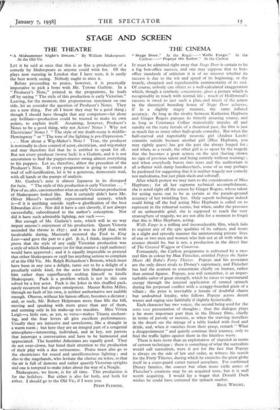STAGE AND SCREEN THE THEATRE "A Midsummer Night's Dream." By
William Shakespeare. At the Old Vic LET it be said at once that this is as fine a production of a comedy by Shakespeare as anyone could wish for. Of the plays now running in London that I have seen, it is easily the best worth seeing. Nobody ought to miss it.
Before proceeding to praise, however, it is practically imperative to pick a bone with Mr. Tyrone Guthrie. In a " Producer's Note," printed in the programme, he leads off by saying " The style of this production is early Victorian." Leaving, for the moment, this preposterous statement on one side, let us consider the question of Producer's Notes. They are a new thing. For all I know they may be a good thing ; though I should have thought that any competent—let alone any brilliant—production could be trusted to make its own points, to explain itself. Assuming, however, Producer's Notes to be a good thing, why not Actors' Notes ? Why not Electricians' Notes ? " The style of my death-scene is middle- Hemingway " or " The tone of the lighting is pre-Depression." . . . How about a Wig-Maker's Note ? True, the producer is nominally in close control of actor, electrician, and wig-maker and may therefore feel that he is entitled to speak for all. But not every producer (worse luck) is a Guthrie, and it is not uncommon to find the puppet-master owing almost everything to his puppets. Let us, therefore, abhor the precedent of the Producer's Note. If every programme is going to contain a wad of self-justification, let it be a generous, democratic wad, with all hands at the pumps of analysis.
Mr. Guthrie's note is almost Japanese in its disregard for facts. " The style of this production is early Victorian . . . " Few of us, alas, can remember what an early Victorian production of Shakespeare looked like. But it certainly didn't have Mr. Oliver Messel's tastefully representational scenery, which is—if it is anything outside 1938—a glorification of the best Edwardian decor. Nor did it have a cast cleverly, if not always successfully, subordinated to the author's conception. Nor did it have such admirable lighting, nor such —.
But enough of Mr. Guthrie's note, which will in no way impair anyone's enjoyment of his production. Queen Victoria ascended the throne in 1837 ; and it was in 1838 that, with incalculable daring, Macready restored the Fool to King Lear—and gave the part to a girl. It is, I think, impossible to prove that the style of any eaxli Victorian production was a style of which Shakespeare (or for that,matter a 1938 audience) would have approved ; and it is equally impossible to pretend that either Shakespeare or 1938 has anything serious to complain of at the Old Vic. Mr. Ralph Richardson's Bottom, which must have been in any case a delight, turns out to be a delight of a peculiarly subtle kind, for the actor lets Shakespeare kindle him rather than superfluously seeking himself to kindle Shakespeare. Puck is a problem which is not in this case solved by a boy actor. Puck is the Joker in this shuffled pack, rarely recurrent but always omnipotent. Master Robin Miller, through no fault of his own, is neither authoritative nor audible enough. Oberon, without his liaison officer, becomes a dictator ; and, as such, Mr. Robert Helpmann more than fills the bill, moving and speaking with more grace than any of them, and seeming only in his make-up too macabre. Miss Vivien Leigh—a little raw, as yet, to verse—makes Titania enchant- ing, and the four lovers all give excellent performances. Usually they are intrusive and unwelcome, like a draught in a warm room ; but here they are an integral part of a congenial atmosphere—interesting, individual, and in key, not parrots that interrupt a conversation and have to be humoured and appreciated. The humbler Athenians are equally good. They do not over-clown, but bend their attention to the production of their play with a due seriousness. Praise must also go to the electricians for sound and unselfconscious lighting ; and also to the stagehands, who levitate the chorus on wires, so that the air is full of demons and rather queerly Victorian sprights and one is tempted to make jokes about the way of a Neagle.
Shakespeare, we know, is for all time. This production is for the holidays. But either is also for both, and both for either. I should go to the Old Vic, if I were you.
PETER FLEMING.









































 Previous page
Previous page